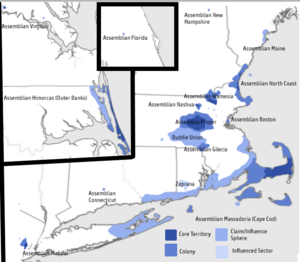Assemblian exceptionalism
Assemblian exceptionalism occasionally known as Assemblic Supremacy is the ultranationalist concept that the Assemblic Sector and the Kingdom of Fontasia is inherently superior or special compared to other micronational sectors. It is a basis of Fontaso-Assemblian nationalism that has existed in the sector since its establishment in 2015. The term was coined by the King of Fontasia in September 2022.
This idea of Assemblian exceptionalism has greatly affected Assemblian and later Fontasian foreign policy and world view, as for a long-time people that did not embrace or weren't accustomed to Fontaso-Assemblian culture were considered "uncivilized" or "barbaric." This belief of Assemblian supremacy dates as far back as the Hexan Wars of 2017 and has persisted since.
The need to civilize so-called barbarian groups was a driving factor for Assemblic colonialism. Assemblian exceptionalism plays a major factor in the Conorian ideology.
History
Assemblian Exceptionalism in the Isolationist Era (2015-2021)
The roots of Assemblian exceptionalism date as far back as 2015, when Fontasians fought off foreign powers from its territory and established the First Assemblic Empire. At first this empire colonized already majority-Fontasian lands previously colonized by the Fontasian Republic. However by 2017, the Assemblians began interacting with hostile foreign peoples, notably the Jaxites, Mappalians and Hexans, in which they saw as uncivilized peoples who wanted to destroy Assemblian civilization. As the Assemblian Empires grew, the more xenophobic they became to non-Assemblians. The hostile interactions with the Hudsennians, a people on the Assemblian northern frontier secured Assemblian exceptionalism's role in the widely isolationist and anti-foreign foreign policy of the empire at the time.
In 2018 the discovery of the Empire of Fleetwoods was mixed with varying reactions among the exceptionalist Imperial government. The Fletovian Emperor was assimilated to Assemblian culture however he ruled a foreign empire. The emperor and most of the government agreed the Fleetwoods should be given an honorary civilized status, however notable opponents to this decision established the short-lived anti-Fletovian Banana Republic. During the first short non-isolationist era in 2018, exceptionalism surprisingly played little role in short lived Assemblian relations with other micronations. In the years following, several groups resistant to Assemblian influence, notably the Hudsennians, Flanovians, Althamians, Serkellians, Phrocians, Tarcellians, Creganians and Cappadanians were viewed as barbaric, and conflicts were frequently fought against them at varying points in history.
The exceptionalist identity was a primary component in the rise of Pan-Assemblianism which saw growth during the later stages of the Assemblic Imperium and the Second Assemblic Federation.
Assemblian Exceptionalism in the Diplomatic Era (2021-????)
After the reintroduction to the micronational community by the Second Assemblic Federation in 2021, Assemblian exceptionalism for the most part played a role in regional micronations. Micronations such as the State of Faltree were originally respected by the Assemblic government, it wasn't until after a souring of relations when Assemblians viewed Faltree as a snobbish, self-interested micronation who wanted to belittle other regional micronations. As the Assemblic Federation grew into a small micronational power, micronations that respected it were given honorary civilized status, notable examples being the Empire of Meritia and the Kingdom of Scynja however other micronations who openly disrespected or Assemblia disliked quickly were considered as barbaric or unworthy.

In 2022, Fontasia, upon its establishment inherited this belief as well, even more to an extent included the idea of viewing enemy or unworthy states as uncivilized. Zeprana was quickly recognized as a barbaric state due to its extreme lack of stability and proper governance as well as its pathetic surrender in the Dilu War, however relations improved towards May until finally returning back to Fontasia viewing Zeprana as a savage micronation. Almendria and the Nexus became other notable micronations being viewed by Fontasia as uncivilized. Assemblian exceptionalism, alongside Conorianism became the major focal points of Fontasian foreign and domestic policy by September 2022.
Basis
Assemblian exceptionalism is a belief that the Assemblic Sector and the Kingdom of Fontasia is superior due to its unique circumstances of governance, culture, stability and history. In some more cases, Assemblian exceptionalism is based on a narrative that the Assemblian or Fontasian people are a chosen people to civilize and colonize lands to grow the Assemblian/Fontasian homeland to other areas and to create the perfect micronation.
The latter belief could also be considered as the largely expansionist and irredentist Greater Assemblia or Greater Fontasia concept, that Assemblia or Fontasia must colonize new lands or reconquer old lands to spread Assemblian/Fontasian values abroad.This belief is analogous to the United State's Manifest Destiny or Fascist Italy's Spazio Vitale. Some of this concept has already been implemented, includiing the Fontasian colonization and exploration of the Corrigith Forest and the growth of the Assemblic colonial empires.
Ergatist connection
Assemblian exceptionalism and the Greater Fontasia concepts were heavily supported by Fontasian Ergatism, which argued for a redeemed Fontasian state with previously held territories under one Fontasian state. Fontasian Ergatism supported a highly xenophobic and assimilationist Fontasian foreign policy, that put the Fontasian people first before all.
Conorian connection
Assemblian supremacy plays a key role in the Conorian ideology, the primary cultural model of the modern Kingdom of Fontasia. The idea of a greater Fontasian state that is superior compared to other micronations is a central part of the Conorian identity, as Assemblian supremacy also recognizes King Conor I as the only and true King of the Fontasian people.